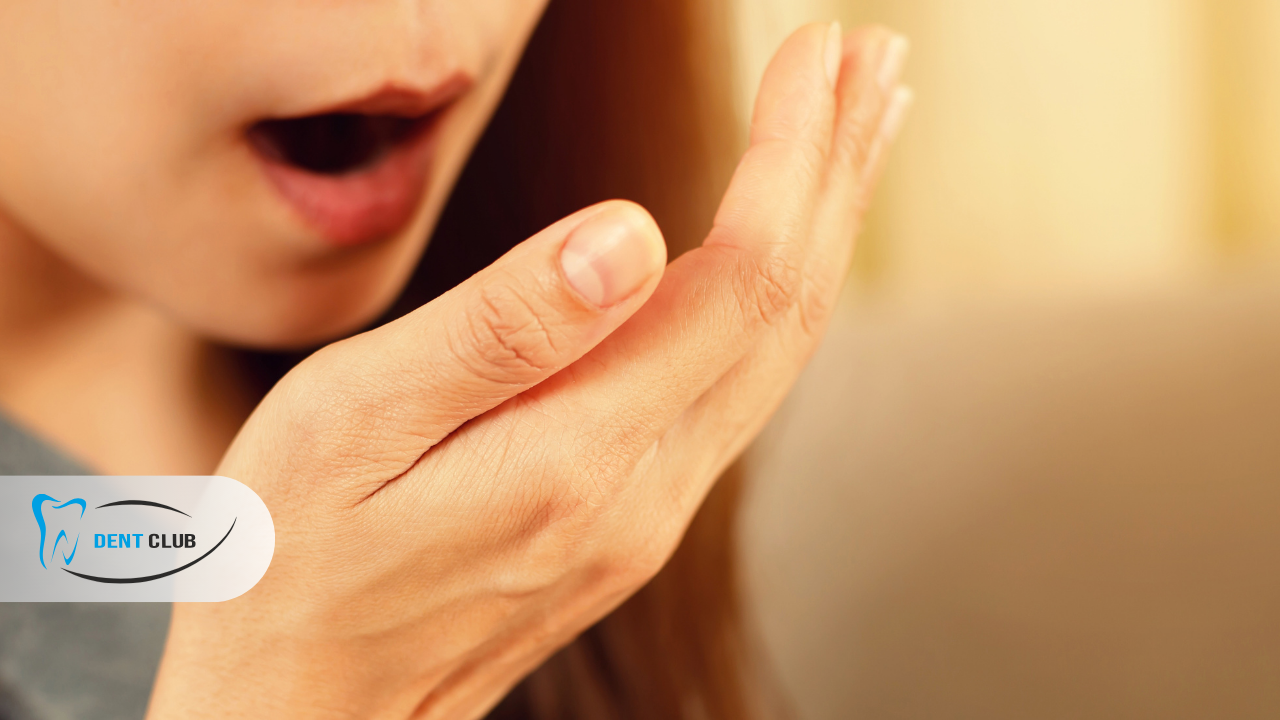Halitosis (Bad Breath): Why It Occurs and How to Prevent It – A Comprehensive Guide for Fresh Breath
Hello dear Dent Club readers!
Today, we’re going to talk about a topic that perhaps affects our social lives the most, harms our self-confidence, and often makes us hesitant to speak about: bad breath (halitosis). Rest assured, you are not alone! Bad breath is a far more common problem than many realize, and with the right information and effective methods, it’s definitely possible to get rid of this uncomfortable condition.
As Dent Club Dental Clinic, our aim is not just to treat your teeth but also to provide you with comprehensive information on general oral and dental health to improve your quality of life. In this article, we’ll cover the causes of bad breath, how to prevent it, and all the questions you might have, all in a friendly, understandable language, without skipping technical details. Ready? Let’s discover the secrets to fresh breath together!
What is Bad Breath? Why Is It So Common?
Let’s start from the beginning: What exactly does bad breath mean? This condition, commonly known as “smelly breath,” is medically termed halitosis. It’s caused by the unpleasant odor produced by bacteria in the mouth, especially those accumulating on the back of the tongue, between teeth, and on food debris, dead cells, and plaque. These bacteria produce sulfur compounds (such as hydrogen sulfide, methyl mercaptan, and dimethyl sulfide), which are responsible for the foul smell.
So, why is it so common? Because the mouth is a warm, moist environment that hosts thousands of different types of bacteria. This provides ideal conditions for bacterial growth. A slight odor you notice upon waking up (morning breath) is considered normal because saliva flow decreases during sleep, leading to dry mouth. However, persistent bad breath throughout the day, even after brushing, is often a sign of an underlying problem, and at this point, professional help is crucial.
Main Causes of Bad Breath: Getting to the Root for a Solution
Bad breath doesn’t have a single cause; it often arises from a combination of factors. Let’s delve into these causes in detail so you can better understand your own situation and determine the most effective solutions.
1. Oral and Dental Health Problems: The Primary Culprit of Bad Odor
Over 90% of bad breath originates from issues within the mouth. Therefore, our first stop should always be the dental chair!
- Tooth Decay and Infections: Cavities provide excellent nooks and crannies for bacteria to hide and multiply. Food particles and bacteria trapped in cavities lead to bad odor over time. Additionally, dental abscesses or infected root canals can cause an intense and unpleasant smell. Such infections can lead not only to bad breath but also to severe pain and general health problems.
- Gum Diseases (Gingivitis and Periodontitis): Gingivitis (gum inflammation) and its more advanced stage, periodontitis, are among the most common causes of bad breath. When gums are inflamed, bacteria accumulate heavily in the gums and in the pockets formed between the teeth and gums. These bacteria break down tissues and produce sulfur compounds, leading to bad breath. This condition is often accompanied by bleeding gums, redness, and swelling. If left untreated, it can lead to serious consequences, including tooth loss.
- Insufficient Oral Hygiene (Irregular Brushing, Not Flossing): This is perhaps the most obvious reason. Inadequate brushing and not flossing lead to the accumulation of food particles and bacterial plaque in the mouth. This plaque hardens over time, forming calculus (tartar), which creates an even larger habitat for bacteria. Without regular and proper oral hygiene habits, fighting bad breath is almost impossible.
- Unbrushed Tongue (Bacteria Accumulation on the Tongue): The surface of the tongue, especially its back, is covered with microscopic bumps and crevices. This structure provides an excellent environment for the accumulation of bacteria, dead cells, food debris, and mucus. The white or yellowish coating on the tongue is, in fact, a colony of odor-causing bacteria. Tongue cleaning is an often-overlooked but extremely important step in combating bad breath.
- Old and Unmaintained Dentures, Bridges: Old or ill-fitting dentures, bridges, and fillings can create spaces where food particles get trapped. Additionally, bacteria and fungi can accumulate on unclean prosthetics, leading to bad breath. Regular cleaning of dentures and periodic check-ups with your dentist are crucial.
2. Respiratory and Digestive System Causes: Sometimes the Odor Comes from Within
Sometimes, the source of bad breath isn’t the mouth itself. Problems in other body systems can also lead to bad breath:
- Sinusitis, Tonsillitis, Pharyngitis: Upper respiratory tract infections can cause bad breath due to mucus and pus accumulation in the nose and throat. Post-nasal drip, in particular, can accumulate at the back of the throat, creating a suitable environment for bacterial growth. Tonsil stones (tonsilloliths), small, foul-smelling stones that form in the tonsils, are also a significant cause of halitosis.
- Reflux and Stomach Problems: Gastric acid refluxing into the esophagus (gastroesophageal reflux disease – GERD) can bring stomach contents into the mouth, causing a sour, unpleasant odor. Additionally, stomach infections like Helicobacter pylori can indirectly contribute to bad breath.
- Nasal Congestion (Mouth Breathing Causes Dry Mouth): Individuals with chronic nasal congestion often breathe through their mouths. This reduces saliva flow, leading to dry mouth (xerostomia). Saliva is a natural cleansing agent that washes away bacteria and food debris. When saliva decreases, bacteria multiply rapidly, leading to bad breath.
3. Eating Habits and Lifestyle: You Are What You Eat (and Smell)!
What we eat, drink, and our general lifestyle play a significant role in how our breath smells:
- Garlic, Onions, Spicy Foods: These foods contain sulfur compounds that, after digestion, enter the bloodstream and are expelled through the breath via the lungs. This odor is temporary and usually disappears once digestion is complete. However, it can be socially bothersome.
- Excessive Coffee and Alcohol Consumption: Both coffee and alcohol can cause dry mouth, which increases bacterial growth and leads to bad breath. Furthermore, when alcohol is broken down by the body, it releases certain acetic compounds that give the breath an unpleasant odor.
- Smoking: Smoking is one of the most well-known and persistent causes of bad breath. Tobacco products cause dry mouth, damage gums, stain teeth, and increase the risk of oral cancer. The chemicals in cigarettes give the breath a characteristic and unpleasant odor. Additionally, smokers have a much higher risk of developing gum disease, which further exacerbates bad breath.
4. Systemic Diseases: Your Body’s Silent Messenger
Sometimes, bad breath can be a symptom of a more serious underlying health problem elsewhere in the body. In these cases, the odor is usually different in nature from breath caused by oral issues:
- Diabetes (Acetone Breath): In uncontrolled diabetic patients, the body starts burning fat for energy, producing substances called ketones. Ketones give the breath a characteristic “acetone” or “rotten apple” smell. This can indicate a diabetic ketoacidosis, which is an emergency.
- Kidney and Liver Diseases: In kidney failure, the body cannot adequately excrete toxins, causing the breath to smell “fishy” or like “urine.” In liver failure, the breath may have a sharp odor, like “mice” or “rotten eggs.” These odors are serious indicators of organ dysfunction.
- Metabolic Disorders: Some rare metabolic diseases can also cause bad breath due to the body’s inability to process certain substances. For example, Trimethylaminuria (fish odor syndrome) results from the body’s inability to break down trimethylamine, leading to a strong fishy odor in the breath, sweat, and urine.
How to Prevent Bad Breath? Steps to Fresh Breath
After understanding the causes of bad breath, let’s get to the most crucial point: How can we get rid of this uncomfortable condition? Here are step-by-step effective methods to help you achieve fresh breath:
1. Regular and Proper Oral Care: Your Foundation!
Since the vast majority of bad breath originates from oral causes, proper and regular oral hygiene is the golden rule.
- Brush Your Teeth Twice a Day: Brush your teeth with the correct technique for at least 2 minutes, once in the morning after breakfast and again at night before going to bed. When choosing toothpaste, look for fluoride-containing options, and if available, those with antibacterial properties. Electric toothbrushes can provide more effective cleaning than manual ones.
- Use Dental Floss and Interdental Brushes: Brushing only cleans about 60% of tooth surfaces. The remaining 40%, which includes between teeth and under the gum line, should be cleaned with dental floss or interdental brushes. Flossing at least once a day significantly reduces bad breath by removing food particles and plaque trapped between teeth. Interdental brushes are an excellent alternative for those with wider gaps between their teeth or those undergoing orthodontic treatment.
- Do Not Neglect Tongue Cleaning (You Can Use a Tongue Scraper): To clean the bacterial film on the tongue, one of the most important sources of bad breath, use a specialized tongue scraper. The tongue cleaner on the back of your toothbrush can also work, but tongue scrapers are more effective. Gently scrape the tongue from as far back as possible towards the front. Doing this regularly every day will make your breath much fresher.
- Supplement with Mouthwashes (Prefer Alcohol-Free Ones): Mouthwashes can provide additional support for your oral hygiene but should never replace brushing and flossing. Choose alcohol-free mouthwashes with antibacterial properties and fluoride. Alcohol-containing mouthwashes can cause dry mouth, which can worsen bad breath. Mouthwash can provide temporary freshness and help reduce bacteria.
2. Routine Dental Check-ups: Professional Touch is Essential!
No matter how good your home care is, professional support is always crucial.
- Get Your Teeth Cleaned Every 6 Months: Over time, plaque that forms on teeth hardens into calculus (tartar). Tartar acts as a haven for bacteria and causes bad breath. Tartar cannot be removed by home brushing; it must be professionally cleaned by your dentist. Regular calculus cleaning is one of the most effective ways to maintain your oral hygiene at its highest level.
- Treat Cavities and Gum Problems Early: Your dentist can detect early-stage cavities and gingivitis during routine check-ups. Treating these problems early not only prevents bad breath from becoming chronic but also avoids the need for more serious and costly treatments. Remember, bad breath is often a warning signal your body sends you!
3. Drink Plenty of Water and Eat Healthily: Freshness from Within
Your overall body health directly affects your breath.
- Drink Plenty of Water: Water increases saliva production, keeping the mouth moist and helping to wash away bacteria and food debris. Sufficient water intake is one of the simplest and most effective ways to prevent dry mouth and maintain natural oral cleanliness. Aim to drink at least 8-10 glasses of water daily.
- Consume Natural Odor-Preventing Foods Like Parsley, Yogurt, Green Tea: Some foods can help eliminate bad breath.
- Parsley: Contains chlorophyll, making it a powerful natural breath freshener. You can chew a sprig of fresh parsley after meals.
- Yogurt: Its probiotics can inhibit the growth of odor-causing bacteria in the mouth and regulate the digestive system.
- Green Tea: Contains potent antioxidants and can inhibit the growth of bacteria in the mouth.
- Crunchy Fruits and Vegetables like Apples, Carrots, Celery: These foods act as a natural “toothbrush” when chewed, helping to clean tooth surfaces and some debris on the tongue, while also increasing saliva flow.
4. Quit Smoking: The Biggest Step for Your Health
Smoking is a major threat not only to your lung and heart health but also to your oral health and breath quality. Quitting smoking is one of the most important steps you can take to eliminate bad breath. If you find this process challenging, do not hesitate to seek support from your dentist or a specialist. Remember, quitting smoking will not only freshen your breath but also dramatically improve your overall health.
5. Treat Underlying Diseases: Consult Specialists
If your bad breath persists despite all the precautions above, it’s highly likely that an underlying systemic disease is the cause.
- After Dental Examination: After ruling out oral causes, your dentist may refer you to an Ear, Nose, and Throat (ENT) specialist (for sinusitis, tonsillitis) or a gastroenterologist (for reflux, stomach problems).
- Internal Medicine Specialist: For conditions like diabetes, kidney, or liver diseases, you may need to consult an internal medicine specialist. Early diagnosis and treatment are vital in controlling such diseases.
Frequently Asked Questions (FAQs) About Bad Breath: All Your Answers
We’ve compiled and answered your most common questions.
1. Is bad breath temporary?
Yes, in some cases, it is temporary. The bad breath you notice when you wake up, known as “morning breath,” is considered normal and is due to reduced saliva flow during sleep. Odor after consuming strong-smelling foods like garlic or onions is also temporary and disappears once digestion is complete. However, if bad breath persists throughout the day despite brushing and oral care, or if it recurs frequently, it could be a sign of an underlying health issue. In such cases, you should definitely consult a dentist.
2. Which doctor should I see for bad breath?
You should first and foremost visit a dentist. The vast majority of bad breath cases originate from oral and dental health problems. Your dentist can identify causes such as cavities, gum disease, tongue coating, or old fillings/dentures through an oral examination. If your dentist determines that the source of bad breath is not oral, they will refer you to the appropriate specialist:
- Ear, Nose, and Throat (ENT) specialist: For respiratory problems like sinusitis, tonsillitis, post-nasal drip, or tonsil stones.
- Gastroenterologist: For digestive system problems like reflux or stomach infections.
- Internal medicine specialist: For systemic health issues such as diabetes, kidney, or liver diseases.
3. Can bad breath be psychological?
Yes, in some cases, psychological factors can also play a role. There is a condition called “halitophobia,” where individuals have a strong anxiety or belief that their breath smells bad, even when there is no actual bad breath. This condition can significantly impact a person’s social life and self-confidence. If you have such concerns and no physical cause can be found, seeking support from a psychologist or psychiatrist might be beneficial.
4. Does chewing gum get rid of bad breath?
Chewing sugar-free gum can provide a temporary solution by increasing saliva flow, but it is not a permanent cure. Saliva is a natural mechanism that cleanses the mouth and washes away bacteria. Chewing gum can temporarily remove odor-causing particles and bacteria in the mouth by increasing saliva production. However, since it doesn’t address the underlying cause, it doesn’t provide a lasting solution. Furthermore, sugary gums can increase the risk of tooth decay.
5. Are there natural remedies for bad breath?
Some natural remedies can provide temporary relief, but professional help is needed to address the underlying cause.
- Cloves: Have antimicrobial properties. Chewing a few cloves can freshen breath.
- Mint: Has a refreshing effect. You can chew fresh mint leaves or drink mint tea.
- Parsley: A natural odor neutralizer due to its chlorophyll content.
- Apple cider vinegar: Gargling with diluted apple cider vinegar can help regulate the mouth’s pH balance and inhibit bacterial growth (however, due to its acidic nature, it should be used cautiously to avoid harming tooth enamel, and the mouth should be rinsed immediately afterward).
- Baking soda: Adding some baking soda to water and gargling can neutralize acidity in the mouth.
These natural remedies can temporarily alleviate symptoms, but if there’s an underlying cause like tooth decay, gum disease, or a systemic health problem, you must consult a dentist or relevant specialist for a solution. Natural remedies only play a supportive role, they are not the main treatment method.
Dent Club Dental Clinic: Your Partner for Fresh Breath and Healthy Smiles in Istanbul, Turkey!
Bad breath can be a problem that lowers your quality of life and affects your social relationships. However, with proper diagnosis and treatment, getting rid of this problem is much easier than you might think. At Dent Club Dental Clinic, located right here in Istanbul, Turkey, we are here to support you with your bad breath concerns! With our expert dentists, we identify the source of your problem through detailed examinations and personalized treatment plans, offering lasting solutions.
Remember, a healthy mouth is the key to fresh breath and a confident smile. Bad breath is not just a cosmetic issue; it’s also an important indicator that provides clues about your overall health. Therefore, do not take this matter lightly, and do not hesitate to seek professional help. All our dental procedures and treatments are performed with the highest standards of care right here in our clinic in Istanbul, Turkey.
May your smile be free, and your breath be fresh! 💙
📍 Dent Club Dental Clinic – Your Address for Healthy Smiles in Istanbul, Turkey! Contact us now to book an appointment and achieve fresh breath. Let us help you regain your healthy smile!


